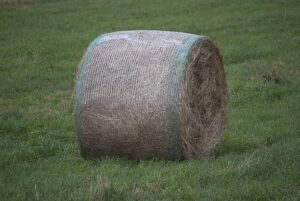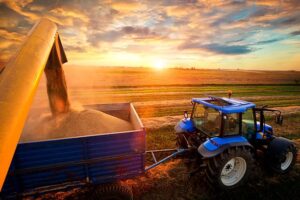Bale Wrap: Revolutionising Agriculture
In the vast expanse of Australia’s agricultural landscape, where every season brings its challenges, one essential tool stands out as a symbol of efficiency and innovation: bale wrap.
This unassuming product plays a crucial role in the preservation and transportation of hay and silage, ensuring that Australia’s livestock industry remains robust and sustainable. Let’s delve into the significance of bale wrap in Australian agriculture and explore how it has revolutionized farming practices across the continent. For strong bale wrap, check this out.
Understanding Bale Wrap
 Bale wrap, also known as silage wrap or stretch film, is a specialized plastic film used to protect bales of hay or silage from moisture, oxygen, and external contaminants. This wrapping process is essential for preserving the nutritional quality of fodder, preventing spoilage, and maintaining the integrity of the feed during storage and transportation.
Bale wrap, also known as silage wrap or stretch film, is a specialized plastic film used to protect bales of hay or silage from moisture, oxygen, and external contaminants. This wrapping process is essential for preserving the nutritional quality of fodder, preventing spoilage, and maintaining the integrity of the feed during storage and transportation.
In Australia, where extreme weather conditions and unpredictable climates are common, bale wrap plays a critical role in mitigating losses and ensuring a consistent food supply for livestock throughout the year. By sealing bales tightly, farmers can create an anaerobic environment that inhibits the growth of harmful bacteria and moulds, thus extending the shelf life of fodder and minimizing wastage.
Benefits of Bale Wrap in Australian Agriculture
- Preservation: Bale wrap’s primary purpose is to preserve the nutritional value of hay and silage. By shielding bales from moisture and oxygen, farmers can prevent degradation and maintain the freshness of the feed for extended periods.
- Storage Efficiency: Bale wrap allows farmers to store fodder outdoors, eliminating the need for expensive storage facilities. This not only reduces operational costs but also frees up valuable space on the farm for other activities. For strong bale wrap, check this out.
- Weather Resistance: Australia’s variable climate poses significant challenges to agricultural operations. Bale wrap provides a protective barrier against rain, wind, and sunlight, ensuring that fodder remains unaffected by adverse weather conditions.
- Convenience: The use of bale wrap streamlines the harvesting and storage process, saving farmers time and labour. With the advent of automated wrapping machines, the task of wrapping bales has become more efficient and less labour-intensive.
- Quality Assurance: By maintaining the quality and freshness of fodder, bale wrap contributes to the overall health and well-being of livestock. High-quality feed leads to improved animal performance and productivity, ultimately benefiting the profitability of farming operations.
The Evolution of Bale Wrap Technology
Over the years, bale wrap technology has undergone significant advancements, driven by a commitment to innovation and sustainability. Modern bale wrap films are engineered to be more robust, more puncture-resistant, and environmentally friendly. These innovations not only improve the efficacy of the wrapping process but also reduce the ecological footprint of agricultural operations.
Furthermore, the development of specialized wrapping machines has revolutionized the way bales are wrapped, making the process faster, more precise, and less labour-intensive. Today, farmers have access to a range of wrapping machines that cater to different farm sizes and requirements, allowing for greater flexibility and efficiency in bale wrapping operations.
The Future of Bale Wrap in Australian Agriculture
As Australia’s agricultural sector continues to evolve in response to changing market dynamics and environmental pressures, the role of bale wrap is likely to become even more pronounced.
With a growing emphasis on sustainability and resource efficiency, farmers are increasingly turning to innovative solutions like bale wrap to optimize their operations and minimize waste. For strong bale wrap, check this out.
Looking ahead, we can expect to see further advancements in bale wrap technology, with an emphasis on biodegradability, recyclability, and overall environmental sustainability. Additionally, ongoing research into alternative fodder preservation methods, such as ensiling and fermentation, may complement the use of bale wrap and offer new avenues for enhancing feed quality and storage efficiency.
Bale Wrap: A Game-Changer in Australian Farming
Bale wrap is not just a plastic film; it’s a lifeline for Australian farmers. By safeguarding hay and silage from the harsh elements, bale wrap ensures livestock receive top-quality feed year-round. Its role in preserving fodder quality and streamlining operations is indispensable for sustainable agriculture Down Under.
Conclusion
Bale wrap has emerged as a cornerstone of modern agriculture in Australia, enabling farmers to overcome the challenges of climate variability and resource constraints. By preserving the nutritional integrity of fodder and streamlining the storage process, bale wrap contributes to the resilience and sustainability of Australia’s livestock industry, ensuring a reliable food supply for generations to come.

 If you have a baling machine, you need high-quality twine to ensure the best results. A good quality twine guarantees a great bale density and optimal cost per bale. Different types of yarn are available on the market, so you must choose the one suitable for your needs. For
If you have a baling machine, you need high-quality twine to ensure the best results. A good quality twine guarantees a great bale density and optimal cost per bale. Different types of yarn are available on the market, so you must choose the one suitable for your needs. For